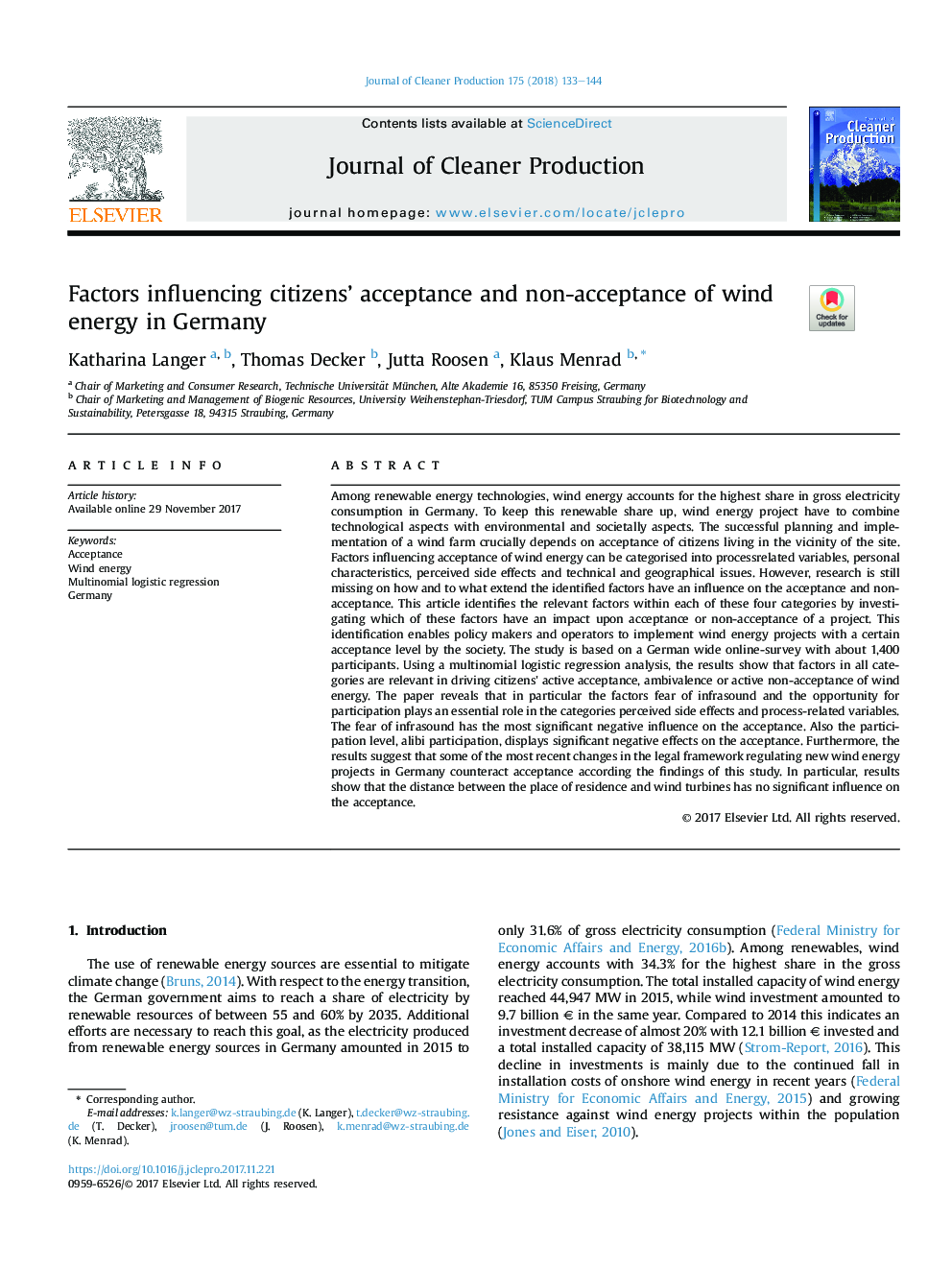| کد مقاله | کد نشریه | سال انتشار | مقاله انگلیسی | نسخه تمام متن |
|---|---|---|---|---|
| 8098940 | 1522078 | 2018 | 12 صفحه PDF | دانلود رایگان |
عنوان انگلیسی مقاله ISI
Factors influencing citizens' acceptance and non-acceptance of wind energy in Germany
ترجمه فارسی عنوان
عوامل موثر بر پذیرش و عدم پذیرش شهروندان از انرژی باد در آلمان
دانلود مقاله + سفارش ترجمه
دانلود مقاله ISI انگلیسی
رایگان برای ایرانیان
کلمات کلیدی
پذیرش، انرژی باد، رگرسیون لجستیک چند ملیتی، آلمان،
ترجمه چکیده
در میان فن آوری های انرژی تجدید پذیر، انرژی باد بیشترین سهم را در مصرف برق ناخالص در آلمان دارد. برای حفظ این اشتراک تجدیدپذیر، پروژه انرژی باد باید جنبه های تکنولوژیکی را با جنبه های زیست محیطی و اجتماعی ترکیب کند. برنامه ریزی و اجرای موفق یک مزرعه بادی به طور عمده بستگی به پذیرش شهروندان در مجاورت این محل دارد. عوامل موثر بر پذیرش انرژی باد می توانند به متغیرهای فرایند، ویژگی های شخصی، عوارض جانبی درک شده و مسائل فنی و جغرافیایی طبقه بندی شوند. با این حال، تحقیق هنوز در مورد چگونگی و چگونگی فاکتورهای شناخته شده تأثیری در پذیرش و عدم پذیرش دارد. این مقاله عوامل مرتبط در هر یک از این چهار دسته را با بررسی اینکه کدام یک از این عوامل بر پذیرش یا عدم پذیرش یک پروژه تأثیر می گذارد، شناسایی می کند. این شناسایی را قادر می سازد سیاست گذاران و اپراتورها برای اجرای پروژه های انرژی باد با سطح پذیرش خاصی توسط جامعه. این مطالعه بر اساس یک بررسی گسترده آنلاین آلمانی با حدود 1400 شرکت کننده انجام شده است. با استفاده از تجزیه و تحلیل رگرسیون لجستیک چندجملهای، نتایج نشان می دهد که عوامل در همه دسته ها در رانندگی فعالیت شهروندان، دوام یا عدم پذیرش فعال انرژی باد مرتبط هستند. مقاله نشان می دهد که به ویژه عوامل ترس از انفوزیون و فرصت برای مشارکت، نقش مهمی را در عناصر جانبی درک شده و متغیرهای مربوط به فرآیند دارد. ترس از انفجار بیشترین تأثیر منفی را در پذیرش دارد. همچنین سطح مشارکت، مشارکت آلبی، تأثیرات منفی قابل توجهی بر پذیرش دارد. علاوه بر این، نتایج نشان می دهد که برخی از جدیدترین تغییرات در چارچوب قانونی تنظیم پروژه های انرژی باد جدید در آلمان بر خلاف یافته های این مطالعه پذیرفته شده است. به طور خاص، نتایج نشان می دهد که فاصله بین محل اقامت و توربین های بادی تأثیر قابل توجهی بر پذیرش ندارد.
موضوعات مرتبط
مهندسی و علوم پایه
مهندسی انرژی
انرژی های تجدید پذیر، توسعه پایدار و محیط زیست
چکیده انگلیسی
Among renewable energy technologies, wind energy accounts for the highest share in gross electricity consumption in Germany. To keep this renewable share up, wind energy project have to combine technological aspects with environmental and societally aspects. The successful planning and implementation of a wind farm crucially depends on acceptance of citizens living in the vicinity of the site. Factors influencing acceptance of wind energy can be categorised into processrelated variables, personal characteristics, perceived side effects and technical and geographical issues. However, research is still missing on how and to what extend the identified factors have an influence on the acceptance and non-acceptance. This article identifies the relevant factors within each of these four categories by investigating which of these factors have an impact upon acceptance or non-acceptance of a project. This identification enables policy makers and operators to implement wind energy projects with a certain acceptance level by the society. The study is based on a German wide online-survey with about 1,400 participants. Using a multinomial logistic regression analysis, the results show that factors in all categories are relevant in driving citizens' active acceptance, ambivalence or active non-acceptance of wind energy. The paper reveals that in particular the factors fear of infrasound and the opportunity for participation plays an essential role in the categories perceived side effects and process-related variables. The fear of infrasound has the most significant negative influence on the acceptance. Also the participation level, alibi participation, displays significant negative effects on the acceptance. Furthermore, the results suggest that some of the most recent changes in the legal framework regulating new wind energy projects in Germany counteract acceptance according the findings of this study. In particular, results show that the distance between the place of residence and wind turbines has no significant influence on the acceptance.
ناشر
Database: Elsevier - ScienceDirect (ساینس دایرکت)
Journal: Journal of Cleaner Production - Volume 175, 20 February 2018, Pages 133-144
Journal: Journal of Cleaner Production - Volume 175, 20 February 2018, Pages 133-144
نویسندگان
Katharina Langer, Thomas Decker, Jutta Roosen, Klaus Menrad,
